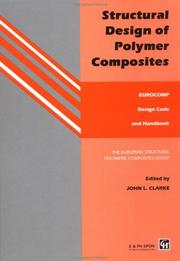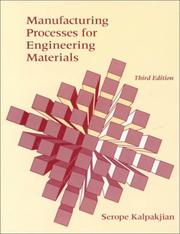| Listing 1 - 10 of 13 | << page >> |
Sort by
|
Book
ISBN: 9044007807 9044008617 Year: 2004 Publisher: Den Haag ten Hagen & Stam
Abstract | Keywords | Export | Availability | Bookmark
 Loading...
Loading...Choose an application
- Reference Manager
- EndNote
- RefWorks (Direct export to RefWorks)
Plastics --- vezelversterkte kunststoffen --- Kunststoffen : technologie --- Kunststoffen : mechanische eigenschappen --- 678

ISBN: 0419194509 1482294818 9781482294811 Year: 1996 Publisher: London E and FN Spon
Abstract | Keywords | Export | Availability | Bookmark
 Loading...
Loading...Choose an application
- Reference Manager
- EndNote
- RefWorks (Direct export to RefWorks)
Independent, practical guidance on the structural design of polymer composites is provided for the first time in this book. Structural designers familiar with design of conventional structural materials such as steel and concrete will be able to use it to design a broad range of polymeric composites for structural applications, using glass fibre reinforced plastic materials, components, connections and assemblies. Samenvatting:Independent, practical guidance on the structural design of polymercomposites is provided for the first time in this book. Structuraldesigners familiar with design of conventional structural materials suchas steel and concrete will be able to use it to design a broad range ofpolymeric composites for structural applications, using glass fibrereinforced plastic materials, components, connections and assemblies.
polymeren --- composieten --- Chemistry --- Plastics --- Bewerking --- Composieten --- Eigenschappen --- Gewapend plastic --- Mechanische eigenschappen --- Sterkteberekening --- Bewerking. --- Composieten. --- Eigenschappen. --- Gewapend plastic. --- Mechanische eigenschappen. --- Sterkteberekening.
Book
Year: 1982 Publisher: Amsterdam New York Oxford North-Holland
Abstract | Keywords | Export | Availability | Bookmark
 Loading...
Loading...Choose an application
- Reference Manager
- EndNote
- RefWorks (Direct export to RefWorks)
Book
ISBN: 8787681080 Year: 1986 Publisher: Aalborg Aalborg University
Abstract | Keywords | Export | Availability | Bookmark
 Loading...
Loading...Choose an application
- Reference Manager
- EndNote
- RefWorks (Direct export to RefWorks)
Book
Abstract | Keywords | Export | Availability | Bookmark
 Loading...
Loading...Choose an application
- Reference Manager
- EndNote
- RefWorks (Direct export to RefWorks)
Metallurgie --- Métallurgie --- 669 --- Academic collection --- 658.56 --- 620.1 --- Materialen : kwaliteitscontrole --- Materialen : mechanische eigenschappen --- Metallurgy --- Materiaaleigenschappen --- Materiaalonderzoek --- Materiaaleigenschappen. --- Materiaalonderzoek. --- 669 Metallurgy
Dissertation
Year: 2013 Publisher: Gent : s.n.,
Abstract | Keywords | Export | Availability | Bookmark
 Loading...
Loading...Choose an application
- Reference Manager
- EndNote
- RefWorks (Direct export to RefWorks)
Because of the rising prices and depletion of crude oil and the rising environmental awareness, biodegradable and biobased polymers get increasing attention and become an alternative to synthetic polymers. The properties of polymers such as polylactide (PLA) and polyhydroxybutyrate (PHB) need to be, however, still further optimized. Certainly the thermal stability of these polymers needs to be strong enhanced. The purpose of this study is to investigate the mechanical and thermal properties of these polymers, and the thermal degradation.In this study, various biodegradable polymers are processed in an injection molding machine. It is a PLA, a high-heat PLA and a PLA with a natural fiber. PP is also produced to compare the biodegradable polymers with this widely used material because they will have to compete with PP. The mechanical properties of these polymers can be investigated and compared by performing tensile tests, flexural tests, and heated tensile tests. The thermal properties such as glass transition temperature (Tg) and the melting temperature (Tm) and the crystallinity are investigated by means of DSC analysis. In addition to the above-mentioned biodegradable polymers, a PHB and a PHB-PLA blend are also investigated by means of DSC analysis. The thermal degradation of the PLA and the high-heat PLA is examined by injecting several series with increasing residence time in the screw. MFI measurements then were done on this series. The high-heat PLA and the PLA with natural fiber have the highest modulus and are more brittle than the other materials. The neat PLA can, however, followed by the PLA with natural fiber and the high-heat PLA, take on the highest load. The DSC analysis shows that the high-heat PLA and the PLA with natural fiber have the highest Tm. The MFI measurements show that the thermal degradation occurs when the residence time in the screw is increased. The neat PLA degrades faster than the high-heat PLA. Door de stijgende prijzen en uitputting van ruwe aardolie en de stijgende milieubewustheid krijgen biodegradeerbare en biogebaseerde polymeren steeds meer aandacht en vormen een alternatief voor synthetische polymeren. De eigenschappen van polymeren zoals bijvoorbeeld polylactide (PLA) en polyhydroxybutyraat (PHB) moeten echter nog verder geoptimaliseerd worden. Zeker de thermische stabiliteit van deze polymeren is nog aan sterke verbeteringen toe. Het doel van dit onderzoek is het onderzoeken van de mechanische en thermische eigenschappen van deze polymeren en de thermische degradatie.In dit onderzoek worden verschillende biodegradeerbare polymeren verwerkt in een spuitgietmachine. Het betreft een PLA, een high-heat PLA en een PLA met een natuurlijke vezel. Ook worden er spuitstukken van PP geproduceerd om de biodegradeerbare polymeren te kunnen vergelijken met dit veelgebruikte materiaal. De biodegradeerbare polymeren zullen namelijk moeten concurreren met dit materiaal. De mechanische eigenschappen van deze polymeren worden onderzocht en vergeleken door het uitvoeren van trekproeven, buigproeven en verwarmde trekproeven. De thermische eigenschappen zoals glastransitietemperatuur (Tg) en de smelttemperatuur (Tm) en de kristalliniteit worden onderzocht via DSC-analyse. Naast bovenvermelde biodegradeerbare polymeren wordt ook een PHB en een PHB-PLA blend onderzocht via DSC-analyse. De thermische degradatie van het PLA en het high-heat PLA wordt nagegaan door verschillende reeksen te spuiten met oplopende verblijftijd in de schroef en hierop MFI-metingen uit te voeren. De high-heat PLA en de PLA met natuurlijke vezel hebben de hoogste modulus en zijn brosser dan de andere materialen. Het nette PLA kan echter de hoogste belasting dragen gevolgd door het PLA met natuurlijke vezel en de high-heat PLA. De DSC-analyse toont aan dat de high-heat PLA en de PLA met natuurlijke vezel de hoogste Tm hebben. Uit de MFI-metingen blijkt dat thermische degradatie o ptreedt wanneer de verblijftijd in de schroef wordt verhoogd. Het nette PLA degradeert sneller dan het high-heat PLA.
Biodegradeerbare polymeren. --- Biogebaseerde polymeren. --- High-heat PLA. --- Kunststoffen - plastics. --- Kunststofverwerking - plastics processing. --- Mechanische eigenschappen. --- Nieuwe materialen - new materials. --- Optimalisatie - optimization. --- PHB. --- PLA. --- Spuitgieten (vormstuk) - injection moulding. --- Temperatuurbestendigheid.
Book
ISBN: 0521239915 0521283922 9780521283922 9780521239912 Year: 1981 Publisher: Cambridge Cambridge University press
Abstract | Keywords | Export | Availability | Bookmark
 Loading...
Loading...Choose an application
- Reference Manager
- EndNote
- RefWorks (Direct export to RefWorks)
Composite materials --- Composites --- Mechanische eigenschappen --- Composietmaterialen. --- Mechanische eigenschappen. --- Nieuwe materialen 67 --- composieten --- materialen --- 621.7 --- 621.7 Plastic or chipless working, forming, treatment of materials in general. Processes, tools, machines, equipment --- Plastic or chipless working, forming, treatment of materials in general. Processes, tools, machines, equipment --- Composites (Materials) --- Multiphase materials --- Reinforced solids --- Solids, Reinforced --- Two phase materials --- Materials --- Materials sciences --- Composite materials.

ISBN: 3527285784 1560817844 9783527285785 Year: 1993 Publisher: Weinheim VCH
Abstract | Keywords | Export | Availability | Bookmark
 Loading...
Loading...Choose an application
- Reference Manager
- EndNote
- RefWorks (Direct export to RefWorks)
Plastics --- Matières plastiques --- Polymeren --- 688 --- kunststoffen --- kunststoffen ; additieven --- kunststoffen ; blend --- kunststoffen ; elektrische eigenschappen --- kunststoffen ; kristalliniteit --- kunststoffen ; mechanische eigenschappen --- kunststoffen ; modifiers --- kunststoffen ; moleculaire opbouw --- kunststoffen ; optische eigenschappen --- kunststoffen ; polymerisatie --- kunststoffen ; rheologische eigenschappen --- kunststoffen ; soorten --- kunststoffen ; thermische eigenschappen --- kunststoffen ; vloeibare kristallen --- Matières plastiques

ISBN: 0201823705 Year: 1997 Publisher: Menlo Park Addison-Wesley
Abstract | Keywords | Export | Availability | Bookmark
 Loading...
Loading...Choose an application
- Reference Manager
- EndNote
- RefWorks (Direct export to RefWorks)
Manufacturing processes --- CIM (computer integrated management) --- materiaalmanagement --- materiaalonderzoek --- produktieproces --- snijden --- verbindingstechniek --- materialen --- mechanische eigenschappen --- metaalbewerking --- Industrial processing --- Manufacture --- Process engineering (Manufactures) --- Processes, Manufacturing --- Processing, Industrial --- Production processes --- Industrial arts --- Production engineering --- Machine-tools --- Materials --- (zie ook: lijmen) --- Materials sciences --- Materials processing --- Manufacturing technologies --- mechanisch materiaalonderzoek --- materiaalkennis
Periodical
Abstract | Keywords | Export | Availability | Bookmark
 Loading...
Loading...Choose an application
- Reference Manager
- EndNote
- RefWorks (Direct export to RefWorks)
Mechanical properties of solids --- Philosophy --- Condensed matter --- Solid state physics --- Matière condensée --- Physique de l'état solide --- Periodicals --- Périodiques --- Matière condensée --- Physique de l'état solide --- Vaste stoffen. --- Roosterfouten. --- Mechanische eigenschappen. --- #TS:WNAT --- Chemistry --- Physical Chemistry --- General and Others --- Applied Physics --- Condensed Matter Physics --- Mechanics. --- Material Science and Metallurgy --- Physics --- Mechanics --- Chemistry. --- Material Science and Metallurgy. --- Physics. --- Périodiques --- EBSCOASP-E EPUB-ALPHA-P EPUB-PER-FT --- Journal
| Listing 1 - 10 of 13 | << page >> |
Sort by
|

 Search
Search Feedback
Feedback About
About Help
Help News
News